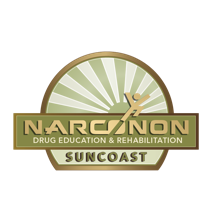Amphetamines belong in the stimulant category of drugs. They can be obtained both as prescription drugs as well as off the street. Here at Suncoast Rehab Center, we have helped many individuals beat their addiction to such drugs.
Amphetamines stimulate the central nervous system and the sympathetic nervous system, thus increasing heart rate and certain other bodily functions. They can make a person feel more focused and more awake. They may also be used, medically, as appetite suppressants.
Short term effects of amphetamines include:
Increased heart rate
Raised blood pressure
A euphoric feeling
Appetite suppression
Reduced fatigue
However prolonged use of amphetamines tends to cause”:
Increased anxiety
Insomnia
Psychosis
Hallucinations
Severe weight loss
Aggressive and sometimes violent behavior
Withdrawal from chronic amphetamine use can be difficult, with the addict experiencing extreme fatigue, physical exhaustion and even suicidal thoughts.
Which Drugs are Amphetamines?
Because amphetamines are a whole class of drugs, there are many drugs that fall under the classification of amphetamines. These include:
- Adderall, Dexedrine, Ritalin and similar prescription drugs
- Methamphetamine – a very commonly abused street drug with severe side effects including calcium loss from bones and major dental problems
- MDMA (also called ecstasy or molly.) The term MDMA is the abbreviation of the chemical name of the drug, methylenedioxymethamphetamine. This is a designer drug, frequently used as a Rave or party drug. It is notorious for producing a feeling of relaxation and camaraderie which may lead to unwise sexual activity.
The best way to find out if a drug falls into the amphetamine category is to look at the chemicals that make up the drug. If the chemical name contains the term “amphetamine” or “amfetamine,” that drug falls into the amphetamine class of drugs.
All of the drug listed above are addictive. This includes prescription drugs – even when they are used on-prescription.
Here is a personal story from a former user:
“When I was in high school I experimented with everything I could get my hands on. Meth (street meth) was one of those experiments. I went from 170 pounds to 135 pounds in a 4 month period. I almost killed myself from ODing. It started off just being “fun”. It turned in a horrific search and struggle for my next high. I wanted to get off meth as I didn’t want to die. I was lucky enough to go to rehab. It was tough to get off the drugs. I got clean and was clean for 10 years.
“Then, when I was in college about 10 years later, I was prescribed Adderall. Adderall is just like meth in that it’s an amphetamine. It got me focused, it got me directed. It also got me up and it got me high. But it also got me addicted and I didn’t even know it. I started off (with the Doctor’s prescription) at 10 mg of Adderall. Every 6 months the Doctor upped my prescription – just like clockwork. I wasn’t complaining of anything, wasn’t trying to ‘drug seek’, he just upped my prescription as part of the ‘normal drug therapy regimen’. By the end of 3 years, I was taking 45 mg and could not survive the day without the drug. Thank god my mom stepped in. I said I wasn’t addicted. She thought differently. She was right. And I thank my lucky stars for her. She got me into the rehab program at Suncoast Rehab Center. I’m now clean of the Adderall – clean of all drugs. And I feel great.”
If you or someone you know is addicted to drugs or alcohol, is self-medicating or is chronically abusing drugs, contact us today for help. We provide free, confidential consultations. Just call (877) 850-7355 today. We have an extremely successful, drug-free program which has helped many, many people become drug-free.
Refs: NCBI.NLM.NIH.gov, Drugs.com, Cesar.umd.edu, Druginfo.adf.org.au, DrugAbuse.gov, Justice.gov, Healthline.com
